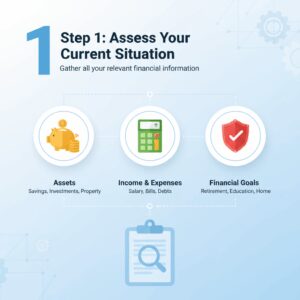
Many people dream of becoming a millionaire. Have you? If so, did you know that, sadly, a million dollars won’t go that far anymore.
Doesn’t that realization change everything? Maybe the idea should be to build wealth rather than save every penny until you have a million dollars. Wouldn’t you agree? Yes? Good, now, that we’ve gotten that straightened out, what are some ways in which a person fifty years of age and beyond, as employed people or not, can still build wealth?
1. Maximize Retirement Contributions
401ks, IRAs, self-employed retirement plans are the number one way an employed person can use to grow wealth. If your employer offers one of these plans, and you have already agreed to contribute to these plans, you can also make annual lump contributions to your plan, allowing you to build upon your wealth by leaps and bounds, readying you to gain access upon your retirement if you so choose.
For the year 2024, the limit for an annual lump sum contribution is $7,000.
2. Invest in Stocks and Bonds
When you invest in the stock of a company, you are essentially purchasing a share of ownership in that company. When you purchase bonds, what you are doing is lending money to the entity issuing the bond – a corporation of the government – for a set period of time in exchange for interest and the return of your principal amount at the end of that period.
The purchasing and selling of stock can help build wealth, however, unless you are versed in the ways of stock markets worldwide, it is probably best to work with a broker when doing so.
3. Give Birth to a Side Business and Build On It
Have you ever heard the saying that if you get paid for what you enjoy doing, you’ll never work a day in your life … or something like that? It’s true. Are you aware that you have skills you can use to build wealth? That you have an expertise or a hobby that you are really good at? Yes?
Well, why not birth a business or work with a freelance website like Fiverr or Upwork where you can create an account for bidding on jobs that you can complete at your pace?
Maybe you were a secretary during your work career and really enjoyed doing that kind of work. If so, you might make a good virtual assistant. That is just one way of building more wealth as this is something you can begin working on even while still employed full time.
Maybe you enjoy arts and crafts, or home design. Check out ecommerce sites like Shopify and Etsy. These online shops are relatively easy to set up and create a store that aptly represents your passion and give you the ability to sell any product you like and make a profit. Take courses in marketing and learn how to obtain and keep clients.
Doing this, even while still employed, can grow into a business you can nurture and grow long after you stop working as an employee for another company. This is something you would have created of your own blood, sweat and tears to be nurtured.
4. Real Estate Investments
Real estate investments or real estate investment trusts (REITs – companies that own or financially back real estate properties that produce income), is another consideration to make when thinking about building wealth. How so? Repetitive income can be earned from the rentals of these investment properties.
There are five types of REITs to consider:
- Retail: About a quarter of these are in shopping malls.
Tip: If you are experiencing a poor economy REITs that have strong cash positions, good real estate may be available at lower prices. However, keep in mind that there are more people shopping online as opposed to then trolling malls for purchases. - Residential: These can be multi-family apartment rentals, AirBnbs, Bed and Breakfasts and even manufactured housing companies.
Tip: Do your research. Some populated areas have more of a need for this type of investment than others. - Healthcare: This is the investment in hospital, medical centers, retirement homes and nursing facilities. As our community ages, and required healthcare demands that rise daily, investing in a healthcare REIT is a good way to go.
Tip: Choose companies with strong balance sheets and have access to low-cost capital. - Office: This is the investment in office buildings where income comes from tenants’ long-term leases.
Tip: The new “work from home” (WFH) trend that has become more popular in the last few years, begs one to consider making invests in smaller buildings, possibly ones where individual office space can be made available for leasing to smaller companies vs. bigger office buildings. - Mortgage: This type of REIT invests in government sponsored mortgages, such as Fannie Mae and Freddie Mac, not the real estate itself.
Tip: When there is an increase in interest rates, the value of your mortgage REIT will decrease.
Let’s take a look at the pros and cons when considering a REIT.
Pros:
- You have control over your investment.
- If you have tenants, you will receive monthly income from those rentals.
- REITs are assets; investment properties that fulfill basic financial needs.
- REITs offer a tax benefit.
- Your investment in a REIT is insured.
Cons:
- There are no monetary guarantees as markets fluctuate.
- In addition to being an investor, you may also have to be a landlord.
- Pure play investments, those that are focused on a particular industry such as a company that only supplies cement, are hard to finance.
- If you have any vacancies, there will be a potential for cash flow issues.
- It is imperative that you have all the details related to your property including titles, mortgages, insurance, etc. before investing.
Be sure to discuss your REIT investment options with your broker before making any final decisions.
5. Never Stop Educating Yourself in Your Chosen Field
Once you’ve chosen a field, the path you choose to take toward increasing your wealth as you age must include the continuation of your education in that field. If investing in stocks and bonds, take the time to study different strategies and current trends. Read books on investing and explore online sources such as webinars that will help you become more knowledgeable. If you have a broker, no question is stupid so don’t ever be afraid to ask questions!
Now, let’s go get started on building your wealth!
Unlock Full Article
Watch a quick video to get instant access.









